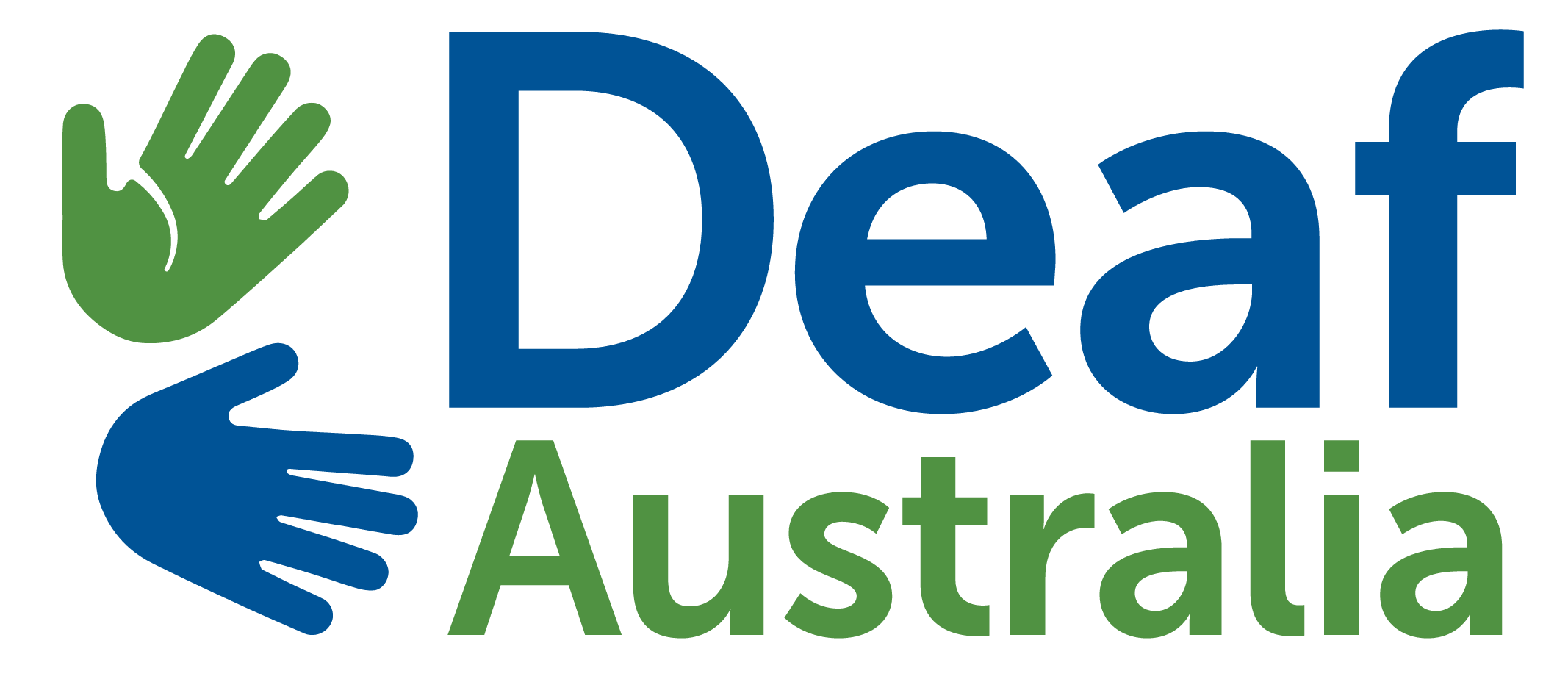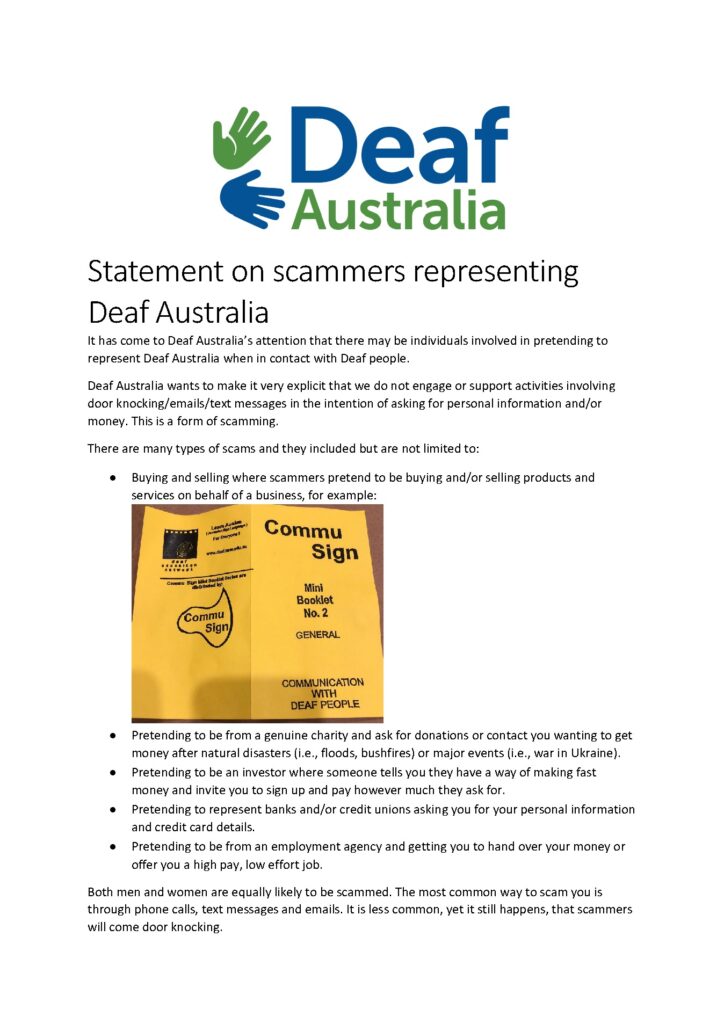No products in the cart.

DEAF AUSTRALIA RESOURCE
Self Advocacy: Interpreters
Published: October 2023.
We have developed a document, including three advocacy letter templates, for the Deaf community to use in regards to self advocacy about interpreters.
Learn about your rights, the usual process for booking interpreters, and how to show businesses and organisations that you have a right to your preferred interpreter. You can use these tools to educate them and let them know that they are violating your human rights if they refuse to accommodate you.

WFD POSITION PAPER
The primacy of Deaf people in the development and teaching of national sign languages
Published: March 2023.
The WFD has been contacted by our Ordinary Members about the issue of hearing people taking the place of Deaf people by teaching sign languages or conducting research on national sign languages. Deaf people are excluded from participation in these activities related to their languages. This is unacceptable and a contravention of best practices in working with minority language communities.
The WFD now issues this Position Paper on Research and Teaching in National Sign Languages as a guide to understanding the importance of deaf-led teaching and research work on national sign languages. English text and International Sign versions are available.
See the full news on their website.
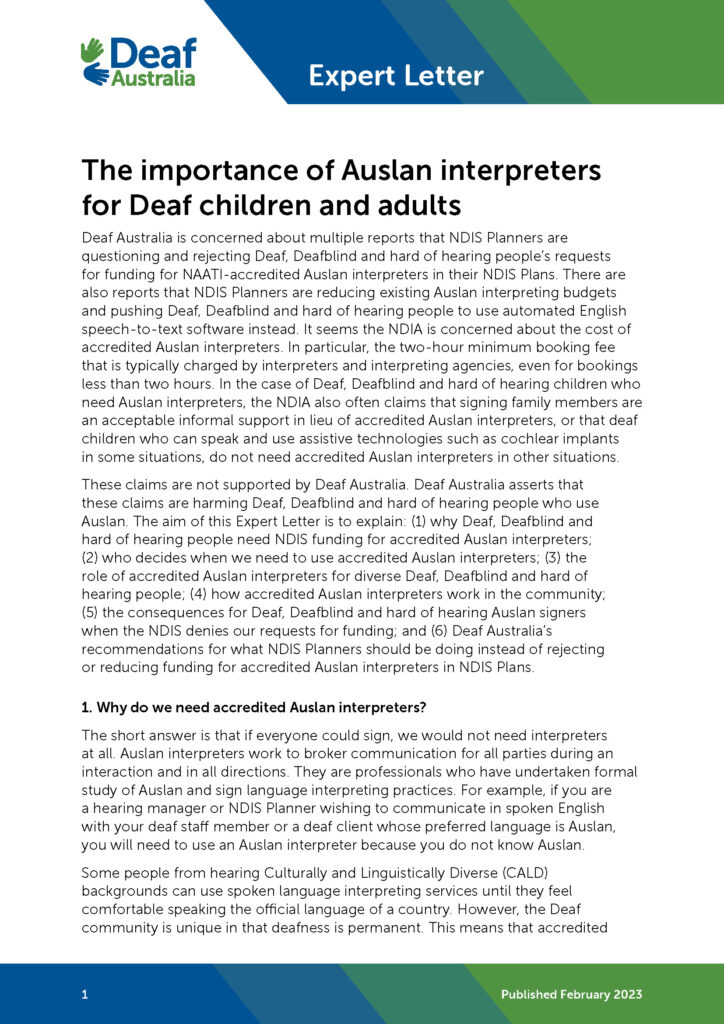
EXPERT LETTER
The importance of Auslan interpreters for Deaf children and adults
Published: February 2023.
Deaf Australia is concerned about multiple reports that NDIS Planners are questioning and rejecting Deaf, Deafblind and hard of hearing people’s requests for funding for NAATI-accredited Auslan interpreters in their NDIS Plans. This Expert Letter contains Deaf Australia’s recommendations for what NDIS Planners should be doing instead of rejecting or reducing funding for accredited Auslan interpreters in NDIS Plans.
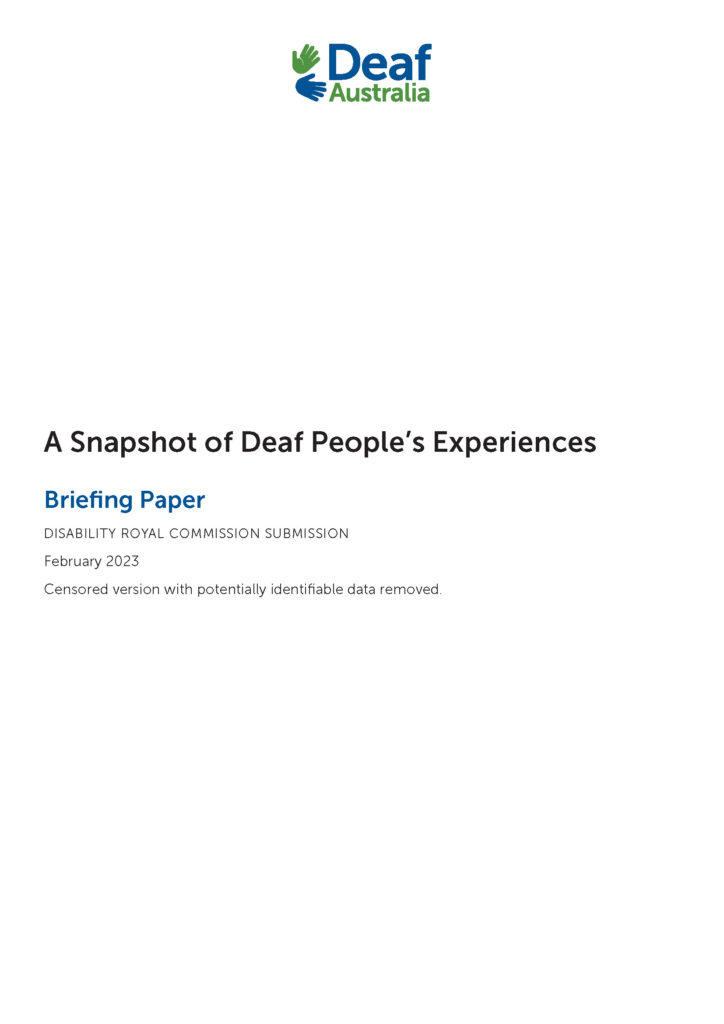
BRIEFING PAPER
A Snapshot of Deaf People's Experiences
Published: February 2023.
This is a copy of our Briefing Paper that we sent to the DRC last year. This document included information from the Deaf Census and interviews our team held as part of our ILC funding. This document has removed any potentially identifying information in order to protect those who were interviewed.

EXPERT LETTER
The importance of Auslan for deaf families in NDIS Plans
Published: 20 April 2022.
Many families in Australia can be described as deaf families. This means they are a family with a deaf infant or child, or have a family member who is deaf. Deaf Australia is deeply concerned about reports from deaf families that the NDIS is refusing to fund private Auslan tutoring for deaf families when it is requested.
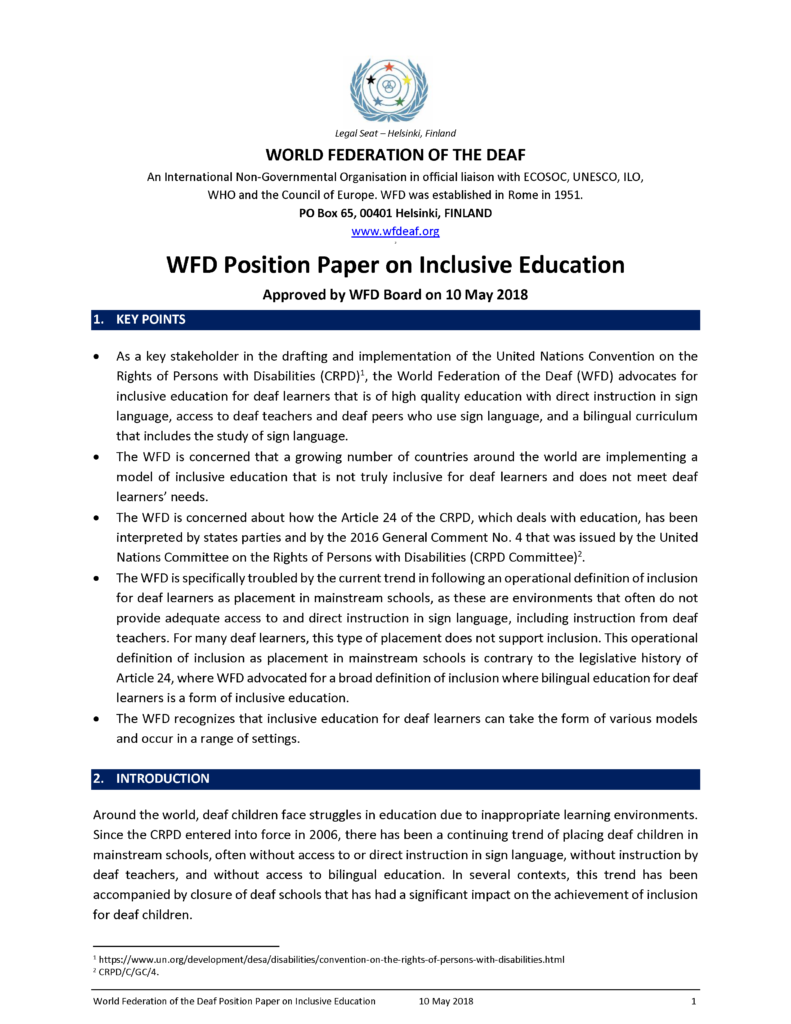
POSITION PAPER
WFD Position Paper: On Inclusive Education
Published: 5 June 2018.
As a key stakeholder in the drafting and implementation of the United Nations Convention on the Rights of Persons with Disabilities (CRPD)1, the World Federation of the Deaf (WFD) advocates for inclusive education for deaf learners that is of high quality education with direct instruction in sign language, access to deaf teachers and deaf peers who use sign language, and a bilingual curriculum that includes the study of sign language.
See full news on their website.

RESEARCH REPORT
Our Culture, Our Value: The Costs of Hearing Loss in Australia
The economic impact of deafness is very large, with a recent estimate suggesting that the costs exceed 1.303 trillion dollars globally (WHO, 2021). Approximately 57% of these costs are incurred by middle-, lower middle-, and low-income countries (McDaid, 2020). Nonetheless, costs remain high within OECD countries, particularly in relation to care, productivity, and quality of life (Ibid, 2020). Yet many of these costs are avoidable and may be reduced through early intervention, expedient screening, and other care and productivity responses.
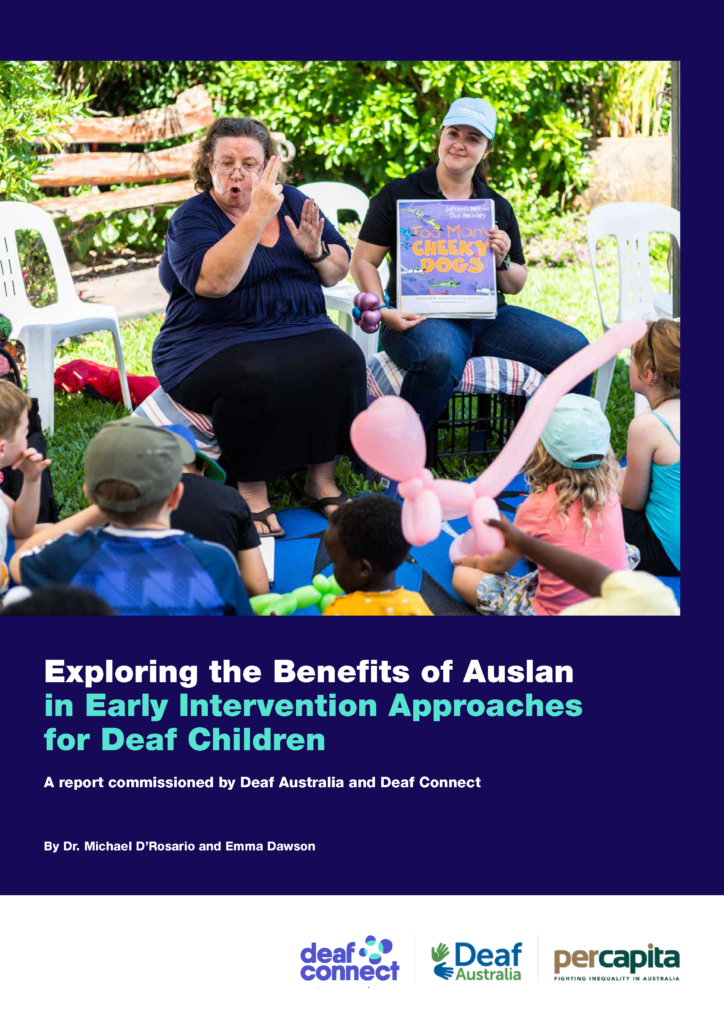
RESEARCH REPORT
Exploring the Benefits of Auslan in Early Intervention Approaches for Deaf Children
While the benefits of sign language are readily apparent, the role of the timing of language intervention, and early intervention are not readily apparent to many who do not possess a thorough understanding of the benefits of such intervention and the process of language acquisition. The decision to support sign language as the first language for a deaf child is a complex one for parents, given that most deaf children are born into hearing families. Nonetheless, the nearly half century’s worth of research supports the role of sign language in early intervention.
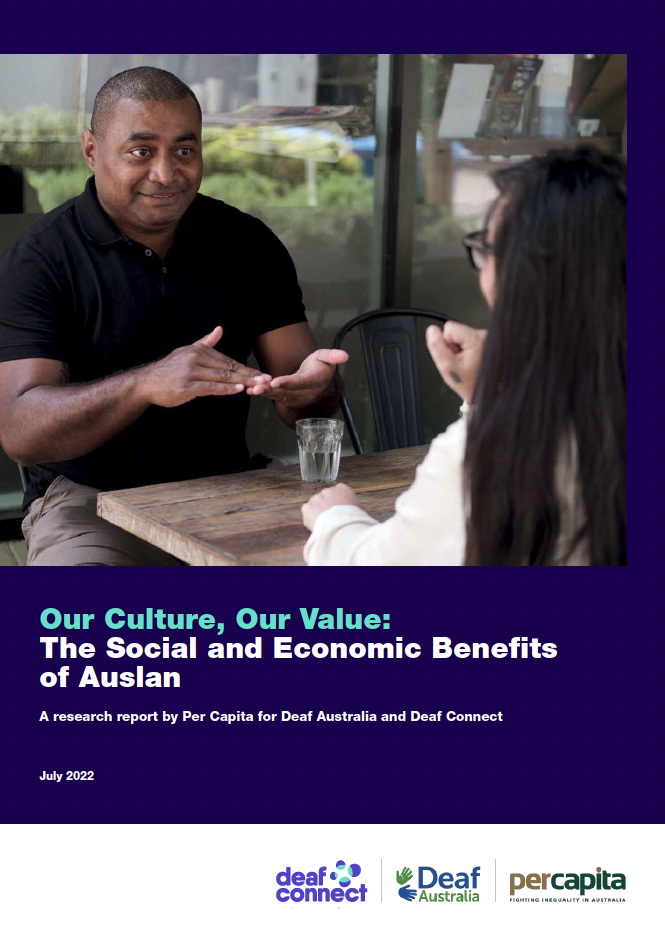
RESEARCH REPORT
Our Culture, Our Value: The Social and Economic Benefits of Auslan
The essential value of language is not something that we give much thought to. Yet, without language, the most fundamental interactions of life would be impossible. Whether it be buying groceries, talking to our neighbours, or accessing government services, language is critical. It is also essential to engaging with, and participating in, cultural practices. Indeed, language underpins so much of our existence that it is often largely invisible, and its value is under-recognised by policymakers and the public at large.

REPORT
Accessible Services for Deaf People who use Auslan in Hospitals and Health Services
Deaf Australia acknowledges that the medical profession’s first and foremost focus is patients’ health and wellbeing. It is equally important that individuals receiving care are aware of what is happening to their body. Lack of access to information and ability to actively participate in one’s primary language can lead to poor treatment and inappropriate post-care that would increase the likelihood of reinjuring or recurrent health episodes that impacts recovery, health and wellbeing.

POSITION STATEMENT
Preferred Auslan Interpreters
It is an assumption universally shared that Deaf, Deafblind and hard of hearing people all have similar, if not the same, communication skills. Just like any other CALD community in society there is a rich diversity of communication skills in the Deaf community. It is also assumed that, if an Auslan interpreter is NAATI certified they are therefore sufficient for the communication needs of a Deaf client. This Position Paper clearly sets out the reasons for why this assumption is incorrect and can even cause harm.
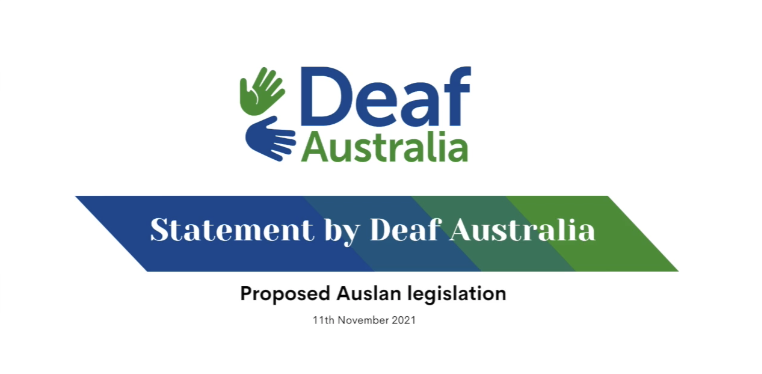
STATEMENT
Response to Propose Auslan Legislation
Deaf Australia is aware that Auslan Corporation Ltd, also known as the Sign Language Council, which was registered as a company earlier this year …
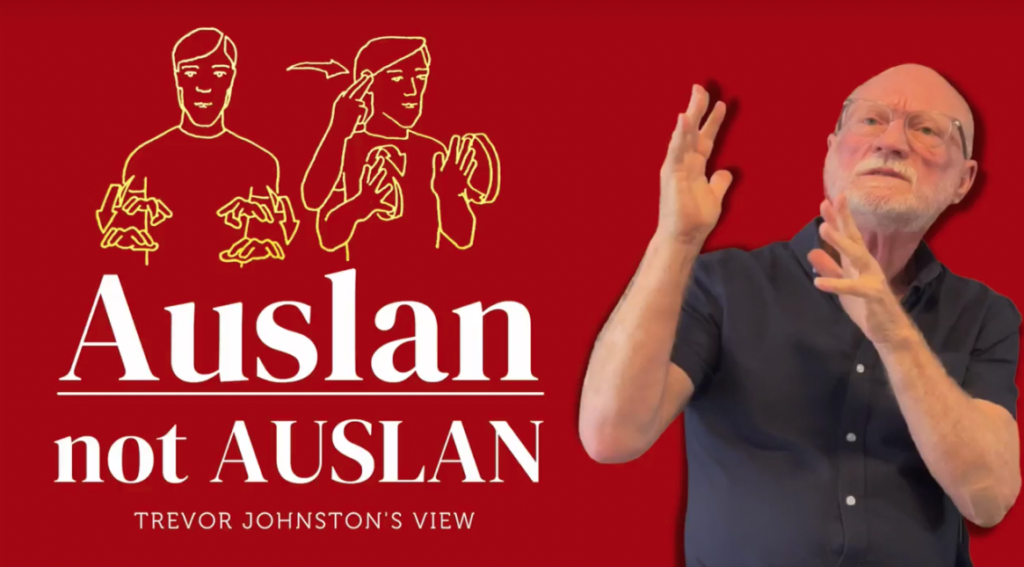
STATEMENT
Auslan or AUSLAN?
“Auslan is a word coined by the Deaf community. It is a term derived from its meaning (Australian sign language), but which was never intended to be an acronym….”
